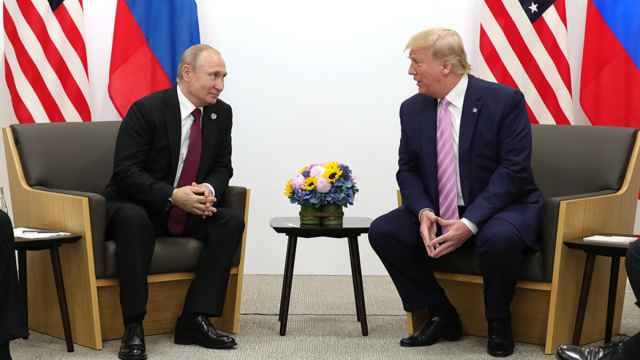It is ironic, of course, that impeachment — if comes to that — will have been sparked by Trump-Ukraine, rather than Trump-Russia. But it is also indicative of a broader truth: The trouble with the Trump presidency is not that it is a foreign invasion, but that it is a domestic subversion.
The deal Donald Trump tried to cut with Ukrainian president Volodymyr Zelenskiy — like the deals his team explored with Russian president Vladimir Putin, or the fact that Vice President Mike Pence and an untold number of military brass ‘choose’ to stay at Trump resorts, or the fact that so many foreign and corporate interlocutors frequent Mar-a-Lago — is symptomatic of the president’s view that the entirety of his office is an opportunity to transact.
There are, after all, things that Trump wants: Money, leverage, fame, and maybe more. Being president makes those things easier to get, not just because there’s a budget from which to pilfer, but because the country and the world are full of people who also want things. People like Putin, or Zelenskiy, or Saudi Crown Prince Mohamed bin Salman, or Chinese premier Xi Jinping, or the carbon industry, or the National Rifle Association. From where Trump sits, you’d have to be blind not to see the opportunity to do business — and an idiot not to take advantage.
Political scientists call this state capture: When private interests are able pervasively and persistently to subvert the workings of government to their own ends, crowding out the interests of their political and economic competitors, and even — or especially — the public at large. It is the apotheosis of corruption, and it’s something we habitually associate with countries like Russia.
Time to break that habit.
Like Putin, Trump sees no distinction between the national interest and his own. For Putin, this is because he’s drunk the Kool-Aid of his messianic destiny, genuinely believing that he has raised Russia from its knees, restoring its place in the pantheon of civilizations. Trump talks a good game, too, but it’s more likely that he has simply never heard of the national interest, or, if he has, considers it little more than a fairy tale.
When states are captured, policymaking transforms into profit-making, empowering those who can pay and disenfranchising everyone else. It is, among other things, grounds for impeachment. But this problem does not begin and end with Trump and his administration.
It will not go away simply because he is removed from office, whether through impeachment or the ballot box. Nor will it subside even when the likes of Pence or Mitch McConnell are voted out. It requires a radical reconfiguration of Americans’ relationship with their state.
We know that, because we’ve seen this all before — in Russia. When communism collapsed — for very good reasons — the state went from omnipresent to AWOL almost overnight.
An apparatus that once told people where to study, where to live, where to work, where to travel, what to read and even what to think suddenly disappeared. When the post-Soviet state eventually emerged, it came as a predator, preying on ordinary citizens and businesses — and captured to the hilt.
Over time, Russians became accustomed to seeing the state first and foremost as a problem. The fact is that most Russians don’t believe the state — theirs or any other — could ever be a beneficent provider of welfare, a neutral regulator or an impartial gendarme, and that fact alone unties the hands of Putin and his cronies to abuse their office
As in Russia, Trumpian transactionalism is the logical outcome of a process that began decades ago, with the right’s crusade against government as the provider of the public good. Lubricated by the insistence that government is always the problem and never the solution, a wedge of austerity, privatization and deregulation has been driven into the relationship between the American government and the American people. The state has gone from something that ensures a level playing field, offers a hand up and protects us from harm, to something that we hope at best will do no harm.
Some right-wing ideologues might have hoped that, deprived of its interventionist mission, the state would simply wither. But it doesn’t. Instead, it remains the most powerful institution in the land, endowed with the power to create and destroy the fortunes of individuals, enterprises and entire communities. Only, whereas this power was once directed at least partly to the public good, it is now increasingly diverted to private interests. And voters tune out.
Some 99 million voting-age Americans sat out the 2016 elections — well more than the 65 million who voted for Hillary Clinton, or the 62 million who voted for Trump. Unchecked by politicians’ fear of a popular backlash, corruption thrives at the highest levels.
Fixing this requires putting the fear of the public back into the minds of politicians, and that is about more than impeachment and elections. For citizens to take every election seriously, politicians of all stripes need to rediscover a positive mission for the government. There can and should be differences of policy and preference, but Democrats and Republicans alike will need to start to see the state as relevant to their lives again, as something worth fighting for and defending, against enemies foreign and domestic.
To coin a phrase, it’s time to make government great again.
A Message from The Moscow Times:
Dear readers,
We are facing unprecedented challenges. Russia's Prosecutor General's Office has designated The Moscow Times as an "undesirable" organization, criminalizing our work and putting our staff at risk of prosecution. This follows our earlier unjust labeling as a "foreign agent."
These actions are direct attempts to silence independent journalism in Russia. The authorities claim our work "discredits the decisions of the Russian leadership." We see things differently: we strive to provide accurate, unbiased reporting on Russia.
We, the journalists of The Moscow Times, refuse to be silenced. But to continue our work, we need your help.
Your support, no matter how small, makes a world of difference. If you can, please support us monthly starting from just $2. It's quick to set up, and every contribution makes a significant impact.
By supporting The Moscow Times, you're defending open, independent journalism in the face of repression. Thank you for standing with us.
Remind me later.








